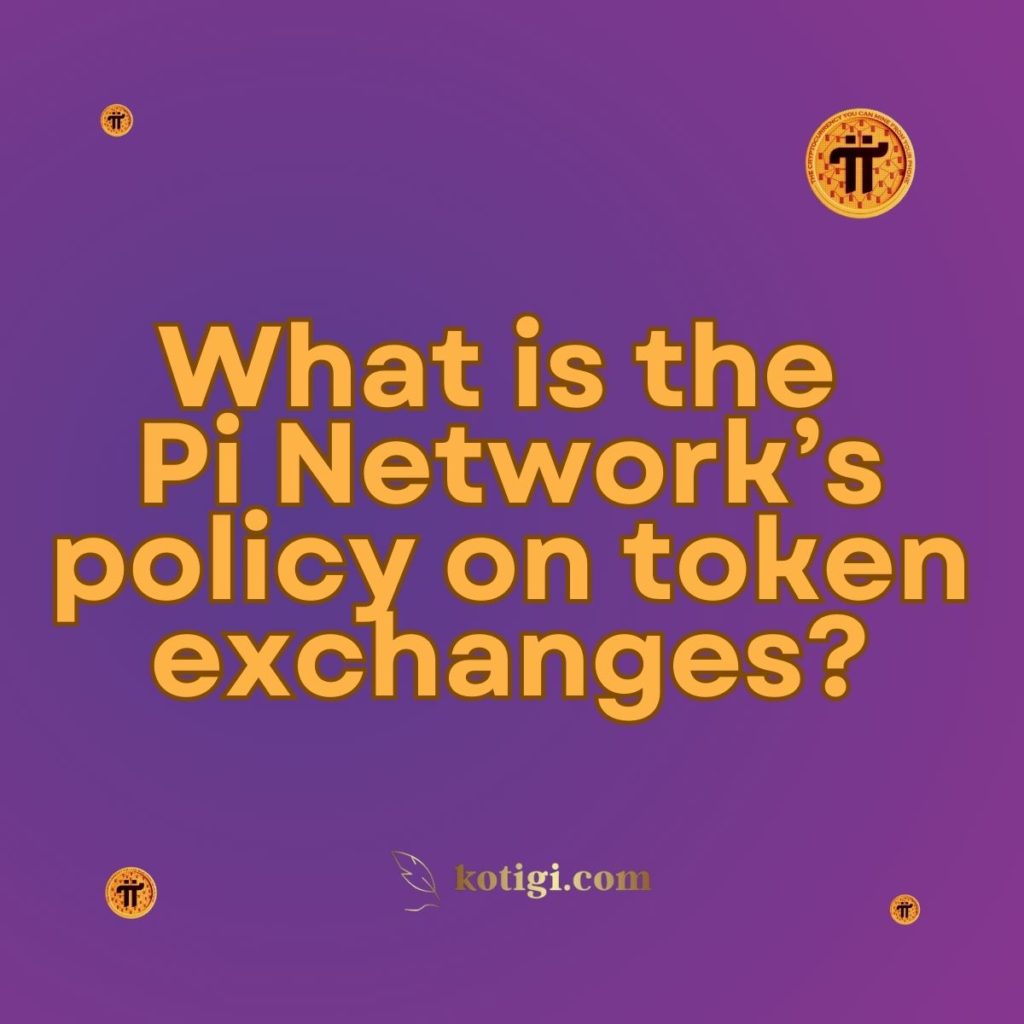
What is the Pi Network’s policy on token exchanges?
Pi Network’s policy on token exchanges remains cautious and conservative, focusing on security and regulatory compliance. As of now, Pi coins (Pi) are not available on public cryptocurrency exchanges since Pi Network is still in its enclosed mainnet phase. The project emphasizes protecting users from premature trading and potential scams by restricting external exchange listings until the network is fully decentralized and compliant with global regulations. Once Pi Network transitions to its open mainnet, the policy is expected to evolve, allowing users to exchange Pi on reputable and regulated platforms.
Introduction
Pi Network has rapidly grown into one of the most popular decentralized cryptocurrencies, attracting millions of users worldwide. However, despite its large user base, Pi is not yet listed on public cryptocurrency exchanges. This decision reflects Pi Network’s cautious approach to token exchanges, prioritizing security, regulatory compliance, and network stability over premature market exposure.
In this article, we will explore Pi Network’s current policy on token exchanges, why the platform has not listed Pi on any public exchanges yet, and what the future holds as the project moves toward its open mainnet. Understanding Pi’s exchange policy is crucial for users and potential investors who are eager to trade or utilize their Pi coins.
Current Status of Pi Network Tokens
Enclosed Mainnet Phase
Pi Network is currently in its enclosed mainnet phase, meaning that Pi coins can only be transacted within the Pi ecosystem and among its users. During this phase, Pi is not accessible on external cryptocurrency exchanges. This enclosed period allows the network to strengthen its infrastructure, refine security protocols, and address any remaining concerns before fully opening to external markets.
This approach ensures that the network matures without external pressures from speculative trading, which can lead to volatility and exploitation by bad actors. Pi Network’s closed environment is designed to protect users and the platform while it prepares for the next stage of its development.
No Exchange Listings Yet
As of now, Pi Network has not listed its tokens on any public cryptocurrency exchanges. This decision is intentional and reflects the project’s focus on security and regulatory compliance. Pi Network has repeatedly warned users against engaging in any form of off-platform trading or attempting to list Pi tokens on unofficial exchanges, as these practices are often linked to scams or fraudulent activity.
Pi Network aims to ensure that its tokens will be listed only on reputable and regulated exchanges when the platform is ready to transition to its open mainnet. This policy safeguards users from the risks of trading Pi in uncontrolled environments.
Rationale Behind the Policy
Security Concerns
One of the primary reasons Pi Network has not yet listed its tokens on exchanges is to mitigate security risks. Early-stage cryptocurrencies are often vulnerable to fraud, price manipulation, and hacking attempts, especially when listed on public exchanges before they are fully decentralized and secured. By keeping Pi within its own network, Pi Network can better control these risks and protect its user base from potential exploitation.
Pi Network’s policy of restricting external exchange listings during the enclosed mainnet phase ensures that users can focus on building and securing the network without the distractions and risks associated with speculative trading.
Avoiding Premature Speculation
Pi Network’s leadership is cautious about allowing premature speculation on its token’s value. Listing Pi on exchanges during the enclosed mainnet phase could lead to volatile price swings, driven by traders looking to profit quickly rather than focusing on the long-term success of the project. Such volatility can harm the reputation and sustainability of the network.
By keeping Pi off public exchanges for now, the project ensures that the token’s value is determined by actual utility and network adoption, rather than speculative hype. This controlled approach aligns with Pi Network’s vision of creating a sustainable and widely adopted cryptocurrency.
Regulatory Compliance
Cryptocurrency regulation varies widely across jurisdictions, and Pi Network is committed to ensuring full compliance with global regulations before listing Pi on exchanges. This cautious approach is intended to avoid any potential legal issues that could arise from premature listings or non-compliance with financial regulations.
Pi Network is working to meet the regulatory requirements of different countries, including those related to anti-money laundering (AML) and Know Your Customer (KYC) processes. By adhering to these regulations, Pi Network aims to build a compliant and transparent platform that can operate legally in various regions.
Future Plans for Token Exchanges
Open Mainnet Transition
The key milestone for Pi Network’s exchange policy will be the transition from the enclosed mainnet to the open mainnet. Once the network is fully decentralized, secure, and compliant with regulations, Pi Network plans to allow users to trade Pi on external cryptocurrency exchanges.
The transition to the open mainnet is expected to open the doors for Pi’s listing on major exchanges, making it accessible to a broader audience and enabling users to exchange their Pi coins for other cryptocurrencies or fiat currencies. However, this will only happen once Pi Network is confident that it can ensure user safety and regulatory compliance.
Criteria for Exchange Listings
When Pi Network is ready to list its tokens on exchanges, it will prioritize reputable, regulated platforms that offer strong security measures and transparency. By choosing trustworthy exchanges, Pi Network aims to protect its users from fraud, hacking, and other risks commonly associated with less-regulated exchanges.
Additionally, Pi Network will likely collaborate with exchanges that comply with global financial regulations, such as AML and KYC protocols. This will ensure that users can trade Pi in a legally compliant manner, further legitimizing the cryptocurrency in the eyes of regulators and the general public.
Potential for Staking and DeFi
As Pi Network evolves, there may be opportunities for integrating Pi tokens into decentralized finance (DeFi) ecosystems and staking mechanisms on exchanges. Staking allows users to earn rewards by locking their tokens into a smart contract, which helps secure the network. DeFi platforms could offer additional use cases for Pi, such as lending, borrowing, and yield farming.
However, these features will likely be introduced after Pi Network has fully transitioned to the open mainnet and established a solid presence on exchanges. The introduction of staking and DeFi could significantly increase the utility and demand for Pi tokens, further driving adoption and growth.
Risks and Warnings for Users
Avoiding Unofficial Exchanges
Pi Network has consistently warned users against attempting to trade Pi on unofficial exchanges. Any platform currently claiming to list Pi is fraudulent, as the token is not yet available for external trading. Engaging with such exchanges could result in users losing their tokens or falling victim to scams.
Pi Network’s policy is clear: users should only trust Pi transactions and trades conducted within the official Pi app and ecosystem. This safeguard is in place to protect users from financial losses and ensure that Pi’s transition to the open market happens safely and securely.
Scams and Fraudulent Listings
Unfortunately, the popularity of Pi Network has led to the rise of scams and fraudulent platforms attempting to capitalize on unsuspecting users. Some platforms may claim to offer Pi trading services or allow users to buy Pi tokens, but these are scams. Until Pi is officially listed on regulated exchanges, users should avoid any offers to trade or buy Pi from third-party sources.
By adhering to Pi Network’s official policy and only engaging with the platform through its official channels, users can avoid falling prey to scams and protect their tokens.
Community Expectations and Patience
Building Trust with the User Base
Pi Network’s cautious approach to token exchanges may frustrate some users eager to trade their Pi tokens, but it is ultimately in the best interest of the community. By prioritizing security, regulatory compliance, and the long-term success of the network, Pi Network is building trust with its user base.
The community’s patience will be rewarded once Pi is ready for listing on exchanges, as this will be done in a manner that ensures stability, security, and legal compliance. Until then, Pi Network encourages users to remain active in the ecosystem by mining, building security circles, and participating in the platform’s development.
Educating Users on Future Exchange Policies
Pi Network is committed to educating its users about the risks and responsibilities of trading cryptocurrency once Pi is listed on exchanges. This includes providing guidance on how to use exchanges safely, understanding the risks of volatility, and complying with tax regulations related to cryptocurrency trading.
By offering educational resources, Pi Network can help ensure that its community is well-prepared for the transition to open trading and can navigate the complexities of the cryptocurrency market responsibly.
Conclusion
Pi Network’s policy on token exchanges is rooted in security, regulatory compliance, and long-term sustainability. By keeping Pi tokens off public exchanges during the enclosed mainnet phase, the platform is protecting users from premature speculation, fraud, and security risks. As Pi Network moves toward its open mainnet, its exchange policy will evolve, eventually allowing users to trade Pi on reputable and regulated exchanges.
While the current restrictions may seem limiting, they are ultimately designed to ensure the success and legitimacy of the Pi Network. Once the platform is fully decentralized and compliant with global regulations, Pi tokens will likely be listed on major exchanges, offering users the opportunity to trade and utilize Pi in a broader financial ecosystem.
Key Takeaways
- Enclosed Mainnet: Pi tokens are currently not available on public exchanges due to Pi Network’s focus on security and development during its enclosed mainnet phase.
- Security First: Pi Network prioritizes user safety by preventing premature exchange listings that could expose the network to fraud or price manipulation.
- Future Exchange Plans: Once Pi Network transitions to the open mainnet, Pi will be available on regulated and reputable exchanges, with full compliance to global financial regulations.
- Avoiding Scams: Users should avoid trading Pi on unofficial exchanges, as these are fraudulent and not endorsed by Pi Network.
- Community Patience: Pi Network encourages users to remain patient and engaged, as the platform’s cautious approach is designed to ensure long-term success and security.





Oh my goodness! Incredible article dude! Many thanks, However
I am having issues with your RSS. I don’t understand the reason why
I am unable to join it. Is there anybody else getting
similar RSS issues? Anybody who knows the answer can you kindly
respond? Thanx!!